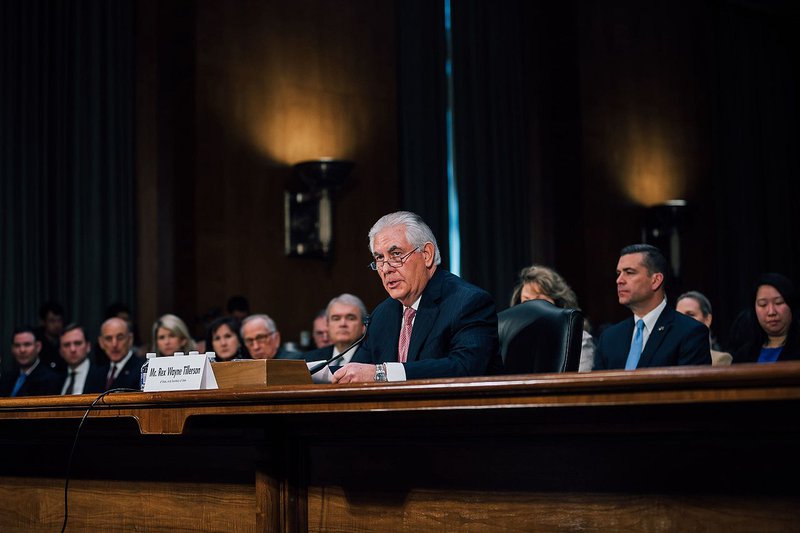Foreign Policy in the 'Alternative Facts' Era
Weekly Article

Flickr/Prachatai
Feb. 9, 2017
In an era of "alternative facts," it isn’t only the media that must do some soul-searching. Foreign policy gurus—who’ve long found refuge from bare-knuckle retail politics—are also facing a radical reckoning.
We saw this in a telling moment during the US Senate confirmation hearings for now-Secretary of State Rex Tillerson. Senator Marco Rubio, the erstwhile Republican candidate, leveled a torrent of scathing questions at his party's nominee. In a heated exchange, Rubio inquired if Tillerson agreed that Russian information operations were directed to disrupt the 2016 presidential election. Tillerson said he did. On cyberattack-related sanctions, Tillerson mostly demurred. Asked if he thought Russian President Vladimir Putin was a "war criminal," Tillerson pointedly said he did not.
This particular back-and-forth between Rubio and Tillerson could probably be described as an outlier in Tillerson's broader treatment during the hearings, which appeared to reveal the former oil boss as expressing mostly conventional center-right views on a variety of foreign policy issues. But the fireworks that accompanied Rubio's tough line of questioning about Russia suggested that he had probed deeper, beneath Tillerson's dutiful rehearsal of Republican orthodoxies, and found him wanting.
Rubio backed Tillerson's confirmation, anyway.
While hardly the only example, the Rubio-Tillerson episode is, in a way, a barometer for the state of the foreign relations profession—and it’s seriously ailing. Despite having been exposed by Rubio's questioning, Tillerson won robust backing from the Senate. Perhaps more worryingly, Tillerson's confirmation testimony, and subsequent approval, seem to lend truth to an increasing sense of nihilism that pervades the study and conduct of foreign policy in and around government. His specific views—and questionable past associations—had hardly any bearing on his confirmation, and his perceived fitness has meant little at a time when expertise—that constant accumulation of wisdom from extended study and experience—is so loudly and roundly ignored at best, and despised at worst.
In the largely cloistered management style apparently preferred by President Donald Trump and his closest advisers, Tillerson’s actual views on Russian adventurism, the third offset strategy, NATO, US arctic policy, and the like have less relevance to the conduct of US foreign policy than perhaps ever before. Love him or hate him, President Trump’s style is obstinately detached from professional analysis, intelligence assessments, and, according to at least one controversial report, even the urgings of senior cabinet officials. Confirmation testimonies for Tillerson—but also General James Mattis, General John Kelly, and former South Carolina Governor Nikki Haley—signal sharp differences in foreign policy outlook between the administration’s “power ministry” appointees and the far less restrained outlook that animated President Trump’s campaign and his early weeks in office.
That such a disjointed approach represents a potentially major hurdle to US national security and diplomatic standing is obvious. Less obvious, though no less real, is that this feature of the new administration also reflects an emerging crisis for the diplomats, analysts, scholars, reporters, and others comprising the US foreign policy community. In such an environment, those on the frontline of foreign policymaking and implementation are placed in a precarious situation by the tensions between fixed US foreign policy obligations and the activist approach preferred by Trump and some of his closest advisers.
Take analysts writing about Eurasia: to which audiences will their analyses now be directed? Before, they would have first and foremost been to their peers in the foreign policy community, followed, to varying degrees, to broader domestic and international audiences. Yet if key parts of the foreign policymaking process are stemmed by an administration operating under alien assumptions (or “alternative facts”), that dramatically diminishes the value of these analyses—and perhaps sweeps it away altogether, gutting its intended purpose to inform crucial policy decisions.
For some, especially academics who might focus more on theory, this might be less of an everyday professional concern, though likely still disorienting. But for the bulk of the foreign policy apparatus, the disconnect between expertise and policy could seem like an existential blow to the profession, which functions on the long-held assumption that US foreign policy is guided by those with baseline respect for knowledge and insight. The worry I hear from fellow analysts, scholars, journalists, and even a few diplomats is that they will be party to, but have no say in, whatever foreign policy moves are to come—for good and for ill.
This isn't to say that there won't be any worthwhile consumers of good foreign policy insight. While the new administration’s revisionist approach to the world is alarming, US government officials and professional functionaries will likely still have some freedom of action—even if on the margins—and good advice will still have utility. By one hopeful interpretation, the White House’s expected neglect of some issues in favor of others may empower diplomats and administrators in some ways. Meanwhile, externally, independent research organizations, teachers and scholars, the general public, and even foreign governments still stand to benefit from insightful, nuanced analysis.
Still, there is no denying that the foreign policy profession is at a tipping point. Even if this administration opts to embrace the foreign policy community’s value, the hangover from months, if not years, of political acrimony will scar the US body politic for some time to come. But this also isn't the time to despair or sit it out, hoping that fortunes improve. There’s work that needs to be done—and the stakes are too high not to do it.